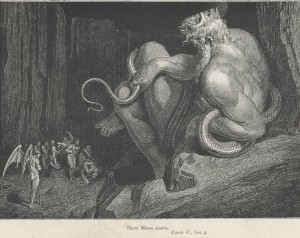Most people know Charles Dodgson by his pen name, Lewis Carroll. Under that name, he secretly wrote such well-known classics as Alice in Wonderland and Through the Looking-Glass. Under his real name, he was a mathematician, but in that other, traditionally more austere role, he occasionally indulged in the same creative and playful writing. His play, Euclid and His Modern Rivals, (published under his real name) gives a fun approach to the question of whether we ought to abandon Euclid’s Elements in favor of modern treatments. The play reads as a critique of several popular geometry text books of his day. In the preface, he lays out his three objectives, which (to paraphrase) were to give evidence that:
- only one text book should be used for teaching and testing elementary geometry,
- there are strong a priori reasons for maintaining the ordering of the propositions, and the treatment of parallels as given by Euclid, and
- no sufficient reasons have been given to abandon Euclid in favor of any other geometry text.
The plays starts as follows.

Minos, judge of the underworld in Greek mythology, is ostensibly grading math exams, but really is critiquing the popular math text books of his day. As he encounters more and more circular arguments or poor reasoning, he is frustrated, but always declares, “Full marks.” For anyone who has had the misfortune of grading amateur mathematical proofs, this image hits perhaps too close to the heart.
Finally, he is visited by the Ghost of Euclid himself. Euclid challenges him to evaluate the text books of the day and to see if they merit replacing the Elements. Dodgson is a proponent of maintaining the Elements and his reasons are elaborated at length through the dialogue of the play.

One of the goals of this blog is to revisit this question, and to challenge the ubiquitous abandonment of Euclid’s Elements. The issue is far more complex today, where geometrical reasoning has been almost completely exorcised from curricula in favor of analytic geometry, algebra, and trigonometric computations. I hope to look at many different reasons for this change, its historical progress, and its current ramifications. If these ideas interest you, I hope you will check back often (or subscribe to the RSS feed) and leave a comment to share your opinions.